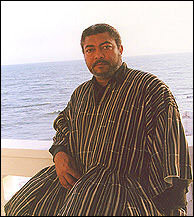 Ghana
towards a Stable Democracy Ghana
towards a Stable Democracy
The Republic of Ghana, once known as the Gold Coast has one of the fastest growing economies in Africa, and is a hub of commercial activities in the West African sub-region. Endowed with a broad range of natural resources that include minerals, timber and agricultural produce, Ghana attracts business visitors from all over the world.

Located on the West coast of Africa with a population of 18 million, Ghana gained political independence from Britain on the 6th of March, 1957 with high hopes of achieving rapid socio-economic development.
| Indeed, in the first two decades following independence, the country's economy experienced rapid economic growth. However, as a result of unsustainable economic policies and over-dependence on one crop, cocoa, for most of the country's foreign exchange earnings, the economy of Ghana had turned in a downward spiral by the mid-1970's. Between 1975 and 1983, the national economy as a result of mismanagement and corruption, declined on the average of about 10 per cent per year.
To arrest this spiral decline, Flt. Lieutenant Jerry John Rawlings, then a junior officer in the Ghana Army intervened on the 4th of June, 1979 to topple the corrupt military regime of General Frederick Akuffo, but ruled briefly and handed over power to the late Dr. Hilla Limann. Now a retired army officer Flt. Lt. Rawlings again led a military coup against Dr. Hilla Limann's corrupt and mismanaged government on the 31st of December, 1981 to form the Provisional National Defence Council (P.N.D.C) government.
After 12 years, Rawlings confounded many by his transformation from uncompromising revolutionary, populist leader of the masses to the President and leader of a democratic party of the 4th Republic of Ghana.
The erstwhile PNDC government which adopted a populist approach reversed its position and decided to negotiate with the World Bank and the International Monetary Fund in 1983 to assist in halting the decline of the economy. A World Bank report of 1998 said Ghana has a GDP of around US$800 million with per capita income of approximately US$400.
Ghana has since 1983 achieved commendable economic progress and is now regarded as an emerging market on the West Coast of Africa. |

